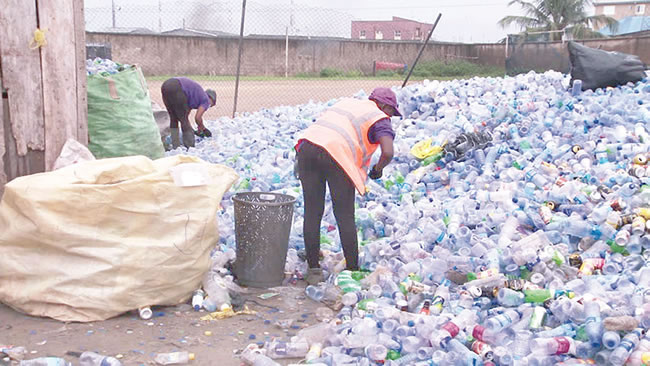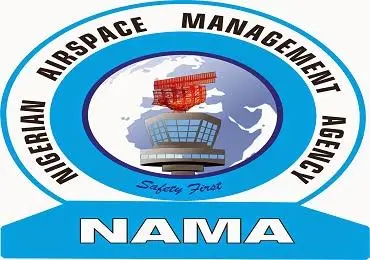Environmental issues are as old as Lagos State but the administration of Babajide Sanwoolu is coming up with a novel idea to tackle a major menace even as another rears its ugly head. DAYO AYEYEMI brings all sides to what can be called the plastic menace in the state.
It’s no longer news that the Lagos State Government has banned styrofoam and single-use plastics to curb pollution in the state.
Despite this, the reselling of used plastics, such as PET bottles and jars, directly to petty traders by scavengers for the packaging of edibles like vegetable oil, palm oil, groundnut, zobo drink, kununzaki {kunu}, herbal concoction {agbo} and cashew nut among others, is generating fresh medical and environmental concerns.
Some of the used PET bottles, it was gathered, are also being sourced by scavengers from medical waste.
All over the state, scavengers are in nearly every environment, searching household waste containers and dumpsites for what can be reused especially water and carbonated beverages’ PET bottles, which the original users might be using again without knowing, once they are sold as second hand items to petty traders who store edibles in them, especially roasted groundnut; a common sight in the state.
Bottled groundnut is also seen as a status symbol for the upscale customers who can afford them, considering the relative high prices different bottle sizes attract, compared to the portion in single-use nylon, which sells between 50 and 100 naira.
Report has it that about 2.5 million tonnes of plastic waste are generated annually in Nigeria, with its commercial capital, Lagos, accounting for 870,000 of the total, which include the daily production of about 60 million sachet water bags and single-use shopping bags.
It is said that the situation may worsen as the population grows from 220 million to the projected 401 million by the end of 2050.
How we get our bottles —Traders
One of the plastic retailers in Ikosi-Ketu area of the state denied buying used plastic bottles from scavengers.
A vegetable and palm oil trader in Ketu who spoke with Saturday Tribune, Mrs Anne Anthony, also said that most retailers rarely buy PET bottles from scavengers.
Rather, she said they pick used plastic bottles at social events and affluent neighbourhoods and clean them for re-use.
When asked if she is aware that some of the used plastic bottles and jars may have been contaminated, she claimed that they normally wash and rinse the PET bottles thoroughly with hot water before use.
Another trader, who identified herself simply as Mama Chinyere, said she used to buy plastic gallons from scavengers, then wash with hot water before use.
According to her, most of the jars for retailing vegetable and palm oil in Mile 12, Oyingbo, Iyana Ipaja and Ikotun markets are used plastic gallons, but thoroughly washed.
She added that some were originally used by chemical companies, before they buy to package edibles.
She said: “Go to Mile 12, Oyingbo markets, each major market has at least one oil depot, and people go there and buy gallons of 10 liters, 20 liters .
“For palm oil also, if you go to Iyana Ipaja and Ikotun, they sell palm oil in used plastic gallons.
“If you don’t buy from there, you can get from people bringing food stuff from Edo and Delta States. They sell in used gallons.
“For people selling in PET plastics, those are plastics picked from parties. They rarely buy from scavengers.”
It’s a significant concern —LAWMA.
When contacted by Saturday Tribune, Director, Public Affairs, Lagos State Waste Management Authority, Mrs Sade Kadiri, said the issue of scavengers reselling used plastics, such as PET bottles directly to petty traders for packaging cooking oil, “is a significant concern”.
She said the agency is aware of the potential health hazards associated with the practice.
“At LAWMA, we are aware of the potential health hazards associated with this practice. Contaminated plastics, when reused without proper treatment, pose serious risks not only to consumers but also to the scavengers themselves, who often operate under unsafe and unhygienic conditions” she said
She however noted that scavengers play a vital role in the waste management ecosystem by helping to reduce the volume of plastics that end up in the environment.
Recognising their contribution, she explained that the Lagos State Government, in collaboration with LAWMA, has embarked on an extensive initiative to integrate the informal recyclers into the formal waste management structure.
“We have renamed them urban management miners to reflect their valuable contribution and to foster dignity in their work” she disclosed.
Some of LAWMA’s strategies to integrate the scavengers, she said, include their enumeration and registration; training and capacity building, buy-back centres and recovery, and awareness creation.
“We have started identifying and registering urban management miners across Lagos State to better monitor and regulate their activities. This registration process ensures that their operations align with health and safety standards.
“Training and retraining programs are conducted to educate urban management miners on their waste handling activities” she added.
To address the issue of direct sales to petty traders, she said LAWMA is establishing strategically-located buy-back centers and recovery hubs across Lagos State to provide an organised platform for urban management miners to sell collected plastics directly to certified recyclers, ensuring these materials are processed safely and hygienically.
She appealed to petty traders and others who are in the habit of purchasing used plastics from scavengers to consider the serious health risks the practice poses to them and their customers.
Reusing contaminated plastics for packaging edible products, such as cooking oil, the LAWMA spokesperson said, could expose consumers to harmful chemicals and pathogens, leading to severe health complications.
“We urge traders to prioritize safety by sourcing clean and properly-processed plastics from certified recyclers or using safer alternatives.
“By making the right choices, you not only protect your own health but also contribute to safeguarding the lives of countless unsuspecting consumers who rely on your products.
“LAWMA is totally committed to establishing a safer, healthier environment while ensuring that waste management contributes positively to the circular economy. We appeal to all stakeholders, including consumers, petty traders, and recyclers, to support this initiative by adhering to best practices in waste handling and recycling,” Kadiri’ said.
Traders use polluted bottles from drains—LASEPA.
Director of Public Affairs, Lagos State Ministry of Environmental and Water Resources, Mr Adekunle Adesina, said the state government will officially commence the enforcement of the ban on single plastic use by the end of January.
Currently, he said the state government is working with the Food Beverage Recycling Alliance (FBRA), an industry collaborative platform committed to mopping post-consumer wastes from the environment.
Also, Mrs Adebayo Adedayo, a senior official at the Lagos State Environmental Protection Agency (LASEPA), said government is not leaving any stone unturned in addressing the menace of plastic waste in the state.
“Presently, you know, there is a ban on single plastic use and the enforcement will take effect this month {January}. It has even taken effect, but will be effective by the end of this January, according to the commissioner.
“There have been meetings with all the stakeholders – producers, importers and manufacturers of these plastics that we are talking about, with the aim for them to be responsible for the waste being generated. It’s their product, and whatever they pump into the environment must be taken care of.
“The government will do its part, then the public will have to do its part, which is the private organizations.
“The producers will have to do their part. So presently, we are trying to work on the Extended Producer Responsibility (EPR). We have the FBRA which are coming together to mop up their waste, the waste being generated from their products.
“But some organizations, {since} it is not compulsory for them to be under FBRA, are saying they want to be alone. Those small businesses, some of them produce this plastic that we are talking about. So, government wants to bring all of them on board under one umbrella.
“Once the EPR is in place and is being implemented and enforced, then that {scavengers selling to petty traders} will be taken care of. The plastics won’t be able to get to them to do that,” she said.
For small business owners selling palm oil, she said they are supposed to go to companies that produce the plastics and buy new ones for their trade.
“But most of them take from the drains, and you can identify the health implications. Those bottles have been polluted, contaminated from water in the drains.
“Some will just wash the bottles a little bit and put in palm oil, which in the long run gets back into the human system.
“This can cause cholera, it can cause many diseases” Adebayo said.
Huge health implications —Exper
Considering the health implications of contaminated plastic usage, a medical practitioner and Director, Lagos State Ministry of Health, Dr. Akinwale Bankole said the use of disposed PET bottles for food items should not be encouraged for many reasons ranging from viral contamination to fungal and bacterial contaminations.
According to him, such plastics could be contaminated easily by fungal organisms, which may easily multiply in such dirty environment where the bottles are disposed.
“Some of this could bear spores that cannot easily be destroyed by ordinary washing or boiling. When the spores get in contact with food items they proliferate to produce more spores, and when consumed could lead to serious respiratory diseases.
“On the other hand, some of the fungal organisms may contaminate food, and if consumed may lead to food poisoning problem, leading to symptoms such as fever, stooling, abdominal cramps, body pain etc. Some fungal organism will release toxin, which can cause serious food poisoning,” he said.
He added that used PET bottles could have bacterial contamination.
This, he said is another area of concern, explaining that, “People can contact tuberculosis when drinking from the bottles contaminated for instance by tuberculosis organism (Mycobacterium tuberculosis).
“This disease is a serious respiratory disease that takes long to treat.
Coughing, weight loss, night sweating, difficulty in breathing among others, are some of the symptoms. It can even lead to death if untreated or if treatment is not commenced early or if there is inconsistency or non-adherence to treatment protocol.
“The bottles can also be contaminated by faecal materials leading to gastroenteritis. The common ones include cholera, which is typically characterised by watery stool (with or without vomiting), abdominal cramps and pain, sunken eyes and others. Loss of body fluid and electrolytes are the main danger, which can cause extreme dehydration and electrolytes imbalance.
“This can lead to death if treatment is not commenced early and appropriately. Some other bacterial can also cause food-borne intoxication. The toxin released leads to disease with symptoms such as watery stooling, vomiting, headache, body pain, dehydration and the likes” he added
Dr. Bankole pointed out that viral contamination can also happen, particularly when the bottles are contaminated with faecal materials.
“When water is taken from such contaminated bottle, one can be exposed and infected with some viruses that can lead to extreme diarrhea and vomiting. Extreme dehydration and electrolyte imbalance is common.
“Viruses that can be contacted faeco-orally include Hepatitis A, which can affect the liver.
“Rotavirus is another of the viruses that can be contacted faeco- orally. It typically affects children, who are usually vulnerable. It causes diarrhea in children” he noted.
He further disclosed that the use of contaminated pet plastics could cause worm infestation.
This, he said materialises, when eggs of some worms contaminate the bottles with faecal materials.
“This can cause stunted growth in children, weight loss, anaemia among many other health challenges. Worse among the challenge in children is school absenteeism and poor academic perform,” the medical practitioner added.
READ ALSO: FRIN proffers solutions to Lagos’ environmental challenge







